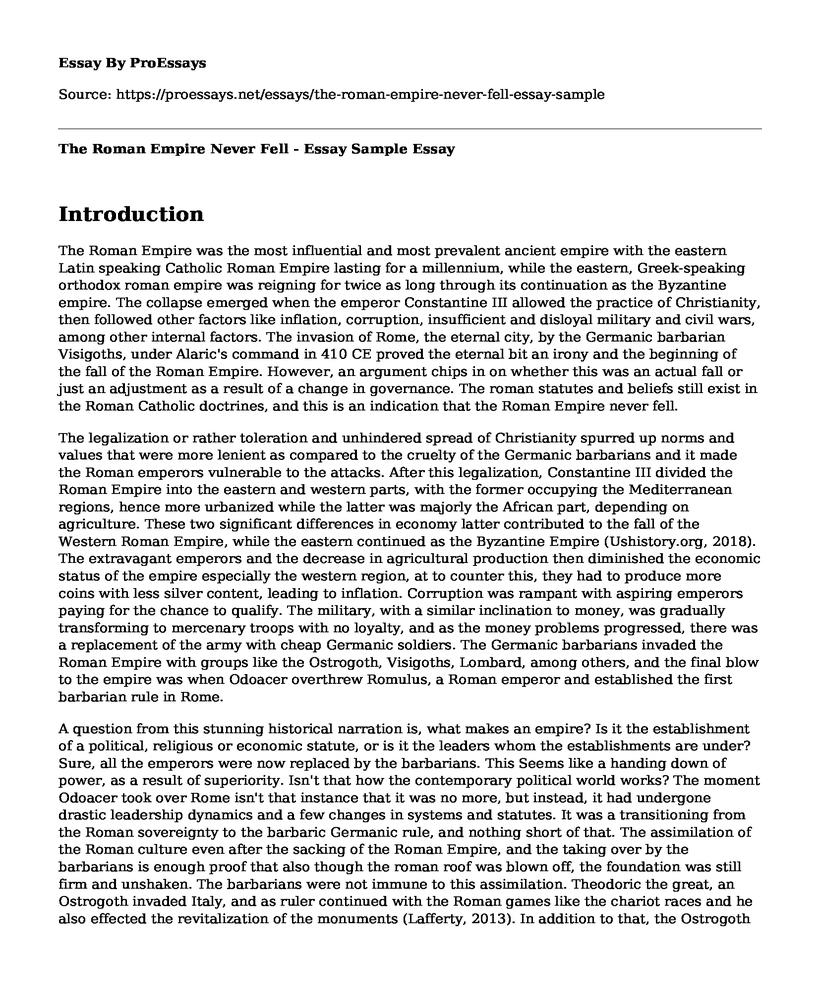Introduction
The Roman Empire was the most influential and most prevalent ancient empire with the eastern Latin speaking Catholic Roman Empire lasting for a millennium, while the eastern, Greek-speaking orthodox roman empire was reigning for twice as long through its continuation as the Byzantine empire. The collapse emerged when the emperor Constantine III allowed the practice of Christianity, then followed other factors like inflation, corruption, insufficient and disloyal military and civil wars, among other internal factors. The invasion of Rome, the eternal city, by the Germanic barbarian Visigoths, under Alaric's command in 410 CE proved the eternal bit an irony and the beginning of the fall of the Roman Empire. However, an argument chips in on whether this was an actual fall or just an adjustment as a result of a change in governance. The roman statutes and beliefs still exist in the Roman Catholic doctrines, and this is an indication that the Roman Empire never fell.
The legalization or rather toleration and unhindered spread of Christianity spurred up norms and values that were more lenient as compared to the cruelty of the Germanic barbarians and it made the Roman emperors vulnerable to the attacks. After this legalization, Constantine III divided the Roman Empire into the eastern and western parts, with the former occupying the Mediterranean regions, hence more urbanized while the latter was majorly the African part, depending on agriculture. These two significant differences in economy latter contributed to the fall of the Western Roman Empire, while the eastern continued as the Byzantine Empire (Ushistory.org, 2018). The extravagant emperors and the decrease in agricultural production then diminished the economic status of the empire especially the western region, at to counter this, they had to produce more coins with less silver content, leading to inflation. Corruption was rampant with aspiring emperors paying for the chance to qualify. The military, with a similar inclination to money, was gradually transforming to mercenary troops with no loyalty, and as the money problems progressed, there was a replacement of the army with cheap Germanic soldiers. The Germanic barbarians invaded the Roman Empire with groups like the Ostrogoth, Visigoths, Lombard, among others, and the final blow to the empire was when Odoacer overthrew Romulus, a Roman emperor and established the first barbarian rule in Rome.
A question from this stunning historical narration is, what makes an empire? Is it the establishment of a political, religious or economic statute, or is it the leaders whom the establishments are under? Sure, all the emperors were now replaced by the barbarians. This Seems like a handing down of power, as a result of superiority. Isn't that how the contemporary political world works? The moment Odoacer took over Rome isn't that instance that it was no more, but instead, it had undergone drastic leadership dynamics and a few changes in systems and statutes. It was a transitioning from the Roman sovereignty to the barbaric Germanic rule, and nothing short of that. The assimilation of the Roman culture even after the sacking of the Roman Empire, and the taking over by the barbarians is enough proof that also though the roman roof was blown off, the foundation was still firm and unshaken. The barbarians were not immune to this assimilation. Theodoric the great, an Ostrogoth invaded Italy, and as ruler continued with the Roman games like the chariot races and he also effected the revitalization of the monuments (Lafferty, 2013). In addition to that, the Ostrogoth produced the edict of Theodoric, a law code which upheld Roman traditions.
Christianity was emphatically pointed out as the burning splint that ignited the fall of the empire. The monotheism practiced by Christians undermined the emperors as gods as they only recognized one true God. Contrary to this postulate, Christianity and more specifically the Roman Catholic is responsible for the continuation of the Roman beliefs through its doctrine. It has kept this empire alive for thousands of years after the raid and overthrowing. The former Roman Empire has now morphed into the Roman Catholic empire. The Vatican, a landlocked city in Rome, is governed under the pope, a mirror of the initial emperor. The senators are now cardinals, the governors as archbishops while the Roman provinces are dioceses. The list could be longer with the doctrine and the church leaders each corresponding to a post or law in the ancient Roman Empire.
Conclusion
A state is not its ruler, but the laws dictating its existence and its occupants. It is, therefore, a fallacy to generalize the fall of a leader to his region of jurisdiction. The Roman emperors failed as result of their corruption, extravagance and poor managerial skills, but the traditions they had installed in the people, and the values they had worked so hard to instill didn't go with them. The Roman traditions surpassed the crude, barbaric rule of the Germanic rulers, and even got into some of them, causing them to Romanize as they established their supposed new empires. And as it now stands, the Roman Empire is as alive as it used to be in the medieval times.
References
Lafferty, Sean D. W. (2013) Law and Society in the Age of Theodoric the Great: A Study of the EdictumTheoderici. Cambridge: Cambridge UP.
Ushistory.org (2018). The fall of the Roman Empire. Ancient civilizations online textbook. http://www.ushistory.org/civ/6f.asp
Cite this page
The Roman Empire Never Fell - Essay Sample. (2022, Jun 23). Retrieved from https://proessays.net/essays/the-roman-empire-never-fell-essay-sample
If you are the original author of this essay and no longer wish to have it published on the ProEssays website, please click below to request its removal:
- The Civil War in Shepherdstown - Research Paper
- Paper Example on the Art of War by Sun Tzu: The United States Military History
- Essay Sample on Vernacular Music of the United States
- Essay Example on Famous Figures of Modernity: Charles Darwin
- Essay Sample on Pearl Harbor Bombing
- Autobiography on Benjamin Franklin
- Essay Example on the Causes of Civil War in Antebellum America







